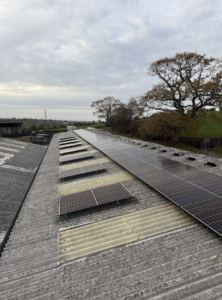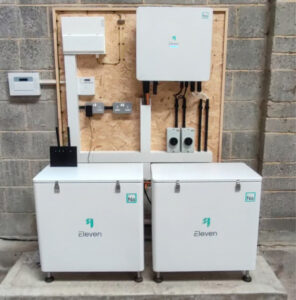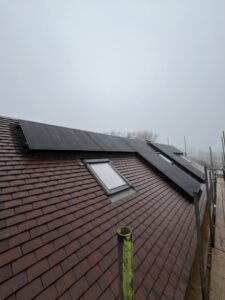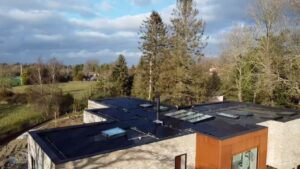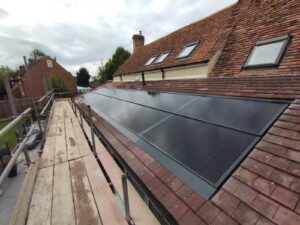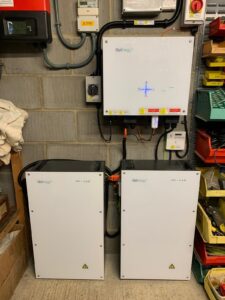Over the last 15 years, UK households have seen a wave of initiatives designed to make our homes more energy efficient. Recycling schemes, food waste bins and local energy projects have gradually become part of everyday life, reducing our environmental impact without compromising quality of life.
Now, with the government’s Net Zero 2050 target on the horizon, the focus is shifting towards bigger changes in how we power, heat and run our homes. For householders, this presents an opportunity not only to cut energy costs, but also to take meaningful steps towards sustainability.
In this blog, we’ll explore practical ways you can reduce your home’s energy consumption, save money on bills, and lower your environmental impact.
What difference can a smart meter make?
Smart meters are becoming a standard fixture in homes across the UK. First introduced in 2011, they allow households to track their energy use in real time, instead of waiting for quarterly bills. The government aims to have 80% of homes and 73% of small businesses using them by the end of 2025.
While there is no legal requirement to have one installed, smart meters offer real benefits. They provide accurate billing, allow you to see which appliances are consuming the most energy, and in some cases unlock cheaper tariffs. If you haven’t already got one, visit Smart Energy GB to find out more information.
Why install solar panels now?
Solar remains one of the most impactful changes a household can make. With energy prices at record highs and solar technology at its most efficient, there has never been a better time to invest.
By generating your own electricity, you can reduce reliance on the grid, protect yourself against price rises, and in many cases, sell unused energy back to your supplier. On top of this, studies show that solar panels can increase the value of your property by between 4% and 14%. Financing options such as Green Mortgages make the upfront investment more accessible than ever. Read our short blog to find out more information.
If you’re considering solar, choosing the right installer is crucial. Look for companies accredited by TrustMark, MCS, RECC or CHAS – it’s the best way to ensure high standards and long-term peace of mind.
Can a Quooker tap really save energy?
It might sound surprising, but even the way we access hot water can have an impact on household energy use. Quooker taps, which provide cold, hot and boiling water instantly, cut down on wasted electricity and water.
Instead of boiling a kettle (often with more water than you need) or running the tap while waiting for hot water from the boiler, a Quooker tap delivers exactly what you need, when you need it. The result is less wasted energy, lower bills, and added convenience.
Pair a Quooker with solar panels, and you’re heating water using free, renewable energy. It’s a small change with a big cumulative impact. Visit the Quooker website to do their sustainability check.
Do batteries make sense without solar panels?
Batteries are often seen as a natural partner to solar panels, storing excess electricity for use later in the day. But even without solar, they can help homeowners make use of cheaper, off-peak tariffs.
Many suppliers now offer discounted unit rates overnight, but few households want to run appliances at 3am. A battery allows you to charge during these cheaper hours and use the energy throughout the following day.
While the return on investment is longer than solar panels, batteries can be a smart addition for households looking to save money and increase energy independence.
Should I switch to a hot water cylinder?
For homes that use a lot of hot water, a cylinder system can be more efficient than a combi boiler. Water is stored ready for use, avoiding the repeated energy demand of heating from cold each time.
Hot water cylinders, particularly indirect models, are a reliable and efficient way of delivering hot water to a household. Here’s how they work and why they stand out compared to other systems:
-
- Efficient Heat Transfer Without Mixing Water Sources
In a hot water cylinder, a heat exchanger coil carries hot water from a boiler or another heat source. This coil transfers heat to the surrounding water in the cylinder without the two water supplies mixing. This method is safer and reduces contamination risk—unlike some instant or tankless systems, which can be vulnerable to pressure fluctuations or limescale buildup affecting the internal flow paths.
- Efficient Heat Transfer Without Mixing Water Sources
-
- Stored Hot Water for Immediate Supply
Heated water rises and is stored at the top of the cylinder, ready for immediate use. This means multiple taps or showers can be used at the same time without a noticeable drop in pressure or temperature—unlike combi boilers, which can struggle with simultaneous demand.
- Stored Hot Water for Immediate Supply
-
- Supports High Water Pressure (Unvented Models)
Many modern hot water cylinders are unvented and fed directly from the mains, allowing them to deliver high-pressure hot water throughout the home—something traditional vented systems and even some combi boilers can’t always achieve.
- Supports High Water Pressure (Unvented Models)
-
- Works With Renewable Energy Sources
Cylinders can be connected to solar thermal panels or heat pumps, storing renewable energy for hot water use. This flexibility isn’t available with most combi boilers or instant heaters, which typically rely on gas or electricity alone.
- Works With Renewable Energy Sources
-
- Consistent Temperature & Thermal Storage
Because water is stored after being heated, you benefit from consistent temperatures even when the heating source is off. This thermal storage aspect makes cylinders more energy-efficient when used with smart timers or off-peak tariffs, unlike on-demand heaters which heat water continuously as needed—potentially using more energy.
- Consistent Temperature & Thermal Storage
-
- Reliability and Simplicity
The system follows a straightforward cycle: cold water in, heat exchange, storage, and outlet. There are fewer moving parts than in combi systems, which often combine central heating and hot water functions in one complex unit—leading to more maintenance issues.
- Reliability and Simplicity
When paired with solar panels, the benefits increase. Free electricity from your panels can be used to heat water, reducing reliance on gas and lowering bills further. Any unused electricity can still be sold back to the grid, giving you a return on your investment.
Where should I start?
Making your home more energy efficient doesn’t need to be overwhelming. From simple changes like installing a smart meter, through to bigger steps like solar panels and battery storage, every improvement adds up, helping you to cut costs and reduce your environmental impact.
If you’re ready to take the next step towards an energy-efficient home, our team at Lumos PV can help you find the right solution. The sooner you make the change, the sooner you can start saving.

